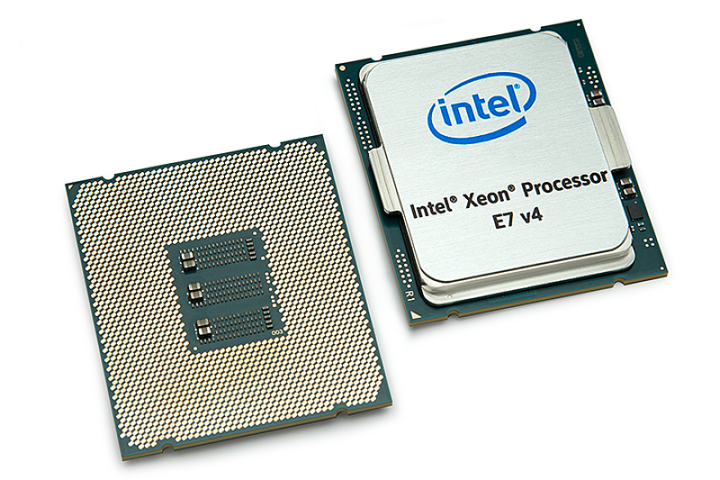
According to a performance fact sheet dished out to the press, these new processors are already installed in new platforms introduced by several OEMs. And while Intel provides the press with all sorts of information regarding how the new chips perform when compared both to the competition and to older Intel Xeon processors, what we really want to know is the meat of this new family: how many chips there are, how fast do they run, and how many cores do they pack into one chip, right?
The Intel website shows 11 new processors ranging from the E7-8893 v4 to the E7-4809 v4. The E7-8893 v4 is at the top of the list with a base clock speed of 3.2GHz, 60MB of cache, four cores, a thermal envelope of 140 watts, and an Intel QPI link speed of 9.6GT per second. This latter detail simply refers to how fast data is transferred from the processor to the motherboard’s IO hub. The higher the better, naturally.
At the bottom of the list is the E7-4809 v4 chip with a base clock speed of 2.1GHz. This chip has 20MB of cache, a thermal envelope of 155 watts, eight cores, and a QPI link speed of 6.4GT per second. This chip does not support Intel Turbo Boost technology, but it does support Intel Hyper-Threading technology. The next chip up in the family tree, the E7-4820 v4, doesn’t support Turbo Boost either, but does support Hyper-Threading, as do all the other listed processors (along with Intel’s Turbo Boost).
Overall, the new processors have base clock speeds ranging from 2GHz to 3.2GHz, cache sizes ranging from 20MB to 60MB, and a power envelope ranging from 115 watts to 165 watts. The number of cores ranges from a mere four to a whopping count of 24, the latter of which is found in the E7-8890 v4 processor. This chip is clocked at 2.2GHz, has 60MB of cache, and a thermal envelope of 165 watts.
“The new processor family offers headroom for growth with traditional four- and eight-socket support, is designed for configurations up to 256 sockets via third-party node controllers, and is used in OEM system designs that currently feature up to 64 sockets,” the company says. “The new processors include more than 70 reliability, availability and serviceability (RAS) features, including Intel Run Sure Technology that is unique to the Intel Xeon processor E7 family.”
That said, these processors support up to 24 terabytes (TB) of DDR4 3DS LRDIMM memory per eight-socket server. They also support Intel’s Advance Vector Extensions 2.0 tech, which doubles the number of floating point operations per clock cycle when compared to first-generation Intel AVX. They also have hardware-enhanced security features to better protect company hardware, software, and data.
For more information about the new Intel Xeon processors E7 v4 family, head here.


